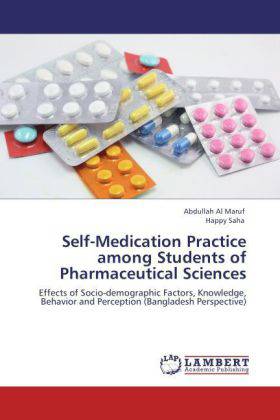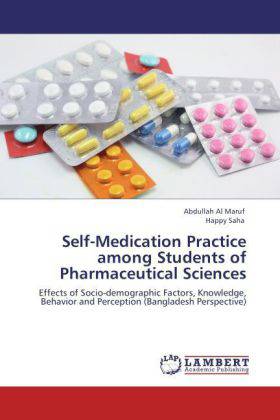
- Afhalen na 1 uur in een winkel met voorraad
- Gratis thuislevering in België vanaf € 30
- Ruim aanbod met 7 miljoen producten
- Afhalen na 1 uur in een winkel met voorraad
- Gratis thuislevering in België vanaf € 30
- Ruim aanbod met 7 miljoen producten
Zoeken
Self-Medication Practice among Students of Pharmaceutical Sciences
Effects of Socio-demographic Factors, Knowledge, Behavior and Perception (Bangladesh Perspective)
Abdullah Al Maruf, Happy Saha
Paperback | Engels
€ 75,45
+ 150 punten
Omschrijving
The objective of this study was to determine the knowledge, behavior and perception of self-medication practice among the students of Pharmaceutical sciences from different private and public Universities of Bangladesh. The study showed that each and every respondent (n=474) (100%) had knowledge about self-medication. The most common indications for self medication were diarrhea (95.15%), fever (94.30%), headache (76.16%), cough (70.04%), gastric pain (65.82%), allergy (52.32%), vomiting (45.78%), vitamin deficiency (45.57%), stomachache (40.51%), constipation (37.13%), insomnia (33.97%), and skin diseases (29.11%). The major reasons for self medication were non-serious illness (87.55%), emergency use (79.96%), quick relief (85.86%), previous experience (83.97%), and unavailability of doctors (89.87%), advice from the family members / friends (51.90%), and cost-effectiveness (41.35%). The result showed that self medication was done mainly by analgesics (65.12%), the drugs acting on GIT (62.14%), cough suppressants (38.15%), antibiotics (22.86%), antihistamines (25.67%), and vitamins (25.81%).
Specificaties
Betrokkenen
- Auteur(s):
- Uitgeverij:
Inhoud
- Aantal bladzijden:
- 140
- Taal:
- Engels
Eigenschappen
- Productcode (EAN):
- 9783847345343
- Verschijningsdatum:
- 18/01/2012
- Uitvoering:
- Paperback
- Afmetingen:
- 152 mm x 229 mm
- Gewicht:
- 213 g

Alleen bij Standaard Boekhandel
+ 150 punten op je klantenkaart van Standaard Boekhandel
Beoordelingen
We publiceren alleen reviews die voldoen aan de voorwaarden voor reviews. Bekijk onze voorwaarden voor reviews.







